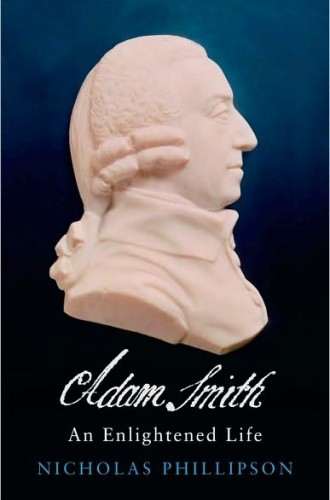A Review of Adam Smith: An Enlightened Life
The Scottish Enlightenment of the 18th century was fascinating because it pondered the deepest questions of how a social order can be structured to maximize human welfare. This movement explored human nature and the social institutions that would work best with the forces that really govern behavior. Philosophers like Thomas Hobbes, Bernard Mandeville, David Hume and Montesquieu contemplated these concerns extensively, but none of them put together a moral and social system as comprehensive as Adam Smith's.
This engaging and detailed biography by historian Nicholas Phillipson gives readers a clear sense of the intellectual dialogue going on among the thinkers of Smith's time while presenting insights into the cultural climate and social customs of 17th-century Scotland.
Read our latest issue or browse back issues.
Though Smith was socially inept, he was a beloved teacher and scholar who challenged many of the social institutions of the medieval period that still held sway in his time. He managed to bridge the gap between an authoritarian Presbyterian church hierarchy and the open skepticism of his close friend David Hume, whose ideas he frequently shared. As a word crafter he labored hard to present a moral, economic, political and legal framework that could guide new thinking about how the world should work. Though he finished major books only in the moral and economic areas, his teaching and informal papers give insights into what he considered to be the complete picture.
For Smith, God is the Creator but not an interventionist in the ongoing system. The key building block of the system is the social manner in which people are created. We are not rational calculating machines who function with a selfish evil nature and are destined for social chaos apart from some transforming experience provided by God. Rather, we are endowed with propensities that, if socialized well, can lead to a harmonious and moral life. Sympathy, which is our ability to identify with the perspectives of others, will go a long way toward guiding our behavior. We seek the affirmation of the group more than we seek some narrowly defined self-interest.
We are also, according to Smith, endowed with moral instincts that allow us to impartially observe and evaluate our own behavior. Our capacity for impartiality and sympathy allows us to move beyond our unsocial and selfish passions to exercise virtues of prudence and self-control. Both of these features involve the ability to go beyond superficial observation. Society does not need a heavy-handed dictator (per Hobbes), nor must it be a selfish competitive jungle (Mandeville). Virtue is an essential feature of social glue. This was the message of Smith's Theory of Moral Sentiments. Though the message was revolutionary and controversial, it captured the attention of people who were seeking a new vision for the modern world.
Another important component of Smith's successful social order was responsible government. Though Smith's work on jurisprudence and public administration was unfinished, it received much attention throughout his career. He contended that the introduction of private property made laws and regulations necessary, but these would not be the province of a ruler or aristocratic class; rather, they would evolve over time from natural principles derived from the needs of advancing commercial activity. Smith felt that the aristocracy and wealthy commercial interests were great threats to social justice and progress.
But can sympathy, the impartial spectator and good government effectively guide individuals amid the rigors of commercial life? On this question The Wealth of Nations has offered an enduring answer. Unfortunately, many today read this classic without the background Smith provided in moral and legal theory. Again, his starting point was an examination of natural human propensities. In this case, Smith argued that people are endowed with an ability and desire to "truck and barter" that blossoms when production becomes specialized. If people do what they do best and then trade with each other, more will be produced and universal opulence will become possible.
Phillipson describes the key features of the economic system Smith proposed. In many ways the system was like a puzzle in which each part complements the others, so that the system would be self-perpetuating. But the pieces of the puzzle would not come together if the entrenched interests of the medieval and mercantilist mind-sets prevailed. Some radical rethinking was necessary. Smith proposed that social good can come from individual actions that are not directed specifically at broad social goals. People have a built-in desire to improve their situation, Smith contended, and given the opportunity to do so they will save, invest, produce and trade. Continuation of that cycle increases the standard of living of all. In this manner the wealth of a nation is enhanced far more than if governmental powers dictated economic decisions or concentrated monopolists dominated the commercial scene. Smith's vision became the starting point for what was to become market capitalism.
This book should find a place among the best biographical material on Smith for several reasons. First, it is written in an accessible fashion with a minimum of technical jargon. Specialists from all disciplines and anyone interested in the birthing of the modern worldview will be fascinated by the story. Second, Phillipson quotes a wealth of primary source material and brings out the nuances of the ideas he presents. Third, Phillipson includes almost every contemporary of Smith who influenced the economist's ideas; this context gives the reader a good feel for the intellectual climate and the controversies that surrounded Smith's work. Fourth, Phillipson makes clear Smith's deep commitment to historical analysis and contextual understanding, thereby offering a corrective to the simple proof texting so common among present-day readers of The Wealth of Nations.
Phillipson offers an abundance of minutia and attends to each recorded social interaction in Smith's life. In addition to discussing Smith's professional contacts from Scotland, England and France, Phillipson describes in detail Smith's social, political and personal relationships. While these are relevant to the purpose of a good biography, it is easy to get lost in the web of relationships. Fast readers may be deterred from absorbing what Smith faced in his groundbreaking effort. Nevertheless, the book is considerably shorter than Ian Simpson Ross's classic The Life of Adam Smith.
Economists may wish for a treatment of the shortcomings of Smith's system. His labor theory of value did not survive the advent of subjective value, which is embodied in the theory of demand. Also, he did not distinguish well between long-run and short-run market effects. These shortcomings, however, do not diminish Smith's contribution to his world and ours.
Phillipson adds much to the current project of discovering the real Smith, who does not fit the common image of a laissez-faire advocate promoting unfettered self-interest. In this regard the book stands with Adam Smith and the Character of Virtue, by Ryan Patrick Hanley; Adam Smith's Moral Philosophy, by Jerry Evensky; and Economics as a Moral Science: The Political Economy of Adam Smith, by Jeffrey T. Young. All these books highlight Smith's passion to connect history, philosophy and economics. That may be his greatest contribution to our generation.







